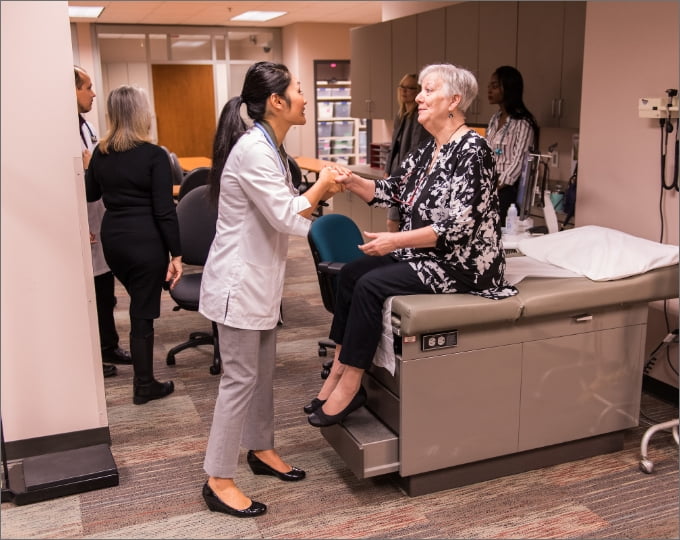
How to Prepare for Your First FNP Interview
August 24, 2022It is an exciting time when you graduate from a graduate nursing program and begin to prepare for your first job interview as a nurse practitioner. This article will take you step by step through the hiring process and show you how to prepare for a nurse practitioner interview.
There are several stages in the interview process. We will first consider what you should do before you interview for an FNP position and then walk through the steps to get ready for the FNP interview. You can increase your confidence by thinking through answers to common interview questions so that you stand out and showcase your unique qualifications.
Are you ready? If so, let’s prepare for your nurse practitioner interview.
Step 1: Remember Your Experience
Interviews can cause you to worry about where you fall short. If you feel nervous because you perceive that you do not have as much experience as other interview candidates, the first step to getting a nurse practitioner job is to remember your experience.
Before you interview and potentially before you even search for nurse practitioner job opportunities, it’s really important to stop and realize how far you have come. Your nurse practitioner graduation is likely a result of long study nights and some even longer clinical days. You have completed assessments and examinations and you may have peers, preceptors, and faculty mentors who can attest to the competencies you have demonstrated.
If you are interviewing for your first nurse practitioner employment opportunity, you may not have experience with patients in an employment position yet, but you have gained experience in any prior RN roles you have held as well as your APRN precepted clinical experiences.
Think through your experience by answering these questions:
- What did you learn from your faculty members?
- How was your clinical preceptor a role model for you?
- When did you rely on your own critical thinking to make a diagnosis and develop a treatment plan?
- Have you used evidence-based guidelines for diagnosis and treatment?
You have experience to draw from even if you have not yet been employed as a nurse practitioner. Remember your experience and be focused on what you do have when you are getting ready for the FNP interview. The NP certification examination also indicates that you have the required entry-level knowledge for the NP specialty role.
Step 2: Polish Your Resume
Your resume is the snapshot of your experience and qualifications that potential employers will see before they really have a chance to get to know you. Therefore, having a resume that not only highlights your accomplishments but stands out from the rest is one way to increase the likelihood you will be selected for interview opportunities. The prospective employer may also reference the resume during the interview.
When building a resume, you can consider several options for structuring the information chronologically or functionally based on your skills. There are countless templates available to help your resume look great, but the most important features of a resume are organization, concise readability, and professional content.
Make sure your FNP resume has the following included:
- Your name and contact information, easily accessible
- Your credentials with current licensure and certifications listed
- Your education, both certificates and college degrees conferred
- Your relevant work experience
It is essential to proofread your final document and also consider the information to omit from an FNP resume, such as content that is potentially divisive or highly personal in nature. To make your resume stand out, you can also tailor the resume to a particular job offering by reviewing the description of responsibilities and the skills listed in the job advertisement.
- Also read: 10 Ways to Make Your FNP Resume Stand Out.
For example, if the FNP position requires licensure in a particular state or CPR certification that you already have, your resume should clearly reflect that you meet these qualifications so the hiring manager can quickly identify you as a potential match for the position. A polished FNP resume will focus on where your skills align with the job of interest.

Step 3: Choose Your Attire
When selecting the outfit you will wear to the FNP interview, it is important that you present yourself in a way that is professional while still allowing you to feel comfortable. Professional attire is appropriate, such as a collared shirt or blouse and slacks. When you feel good in what you are wearing, it often shows in your demeanor. Be sure to choose an outfit that you like. Professional clothing also communicates that you care about the job interview.
It is best to avoid casual clothing such as jeans, t-shirts or leggings in order to present yourself in a manner consistent with what is typically worn when seeing patients in an advanced practice role. It is also a good idea to prepare your attire by ensuring it is steamed or ironed and ready to go the night before. Likewise, if you have never been to the location of the interview, it is a good idea to complete a practice drive so you know where you are going ahead of time. These tips can help alleviate some stress on the interview day so that you can focus on presenting yourself well as you communicate to answer interview questions.
Step 4: Practice Questions
When preparing for a nurse practitioner interview, remember that one purpose of the interview is for the hiring manager to learn about you. They are going to ask questions to determine whether you are the right fit for the position. If you feel you are the right fit, it is your job during the interview to make sure you communicate just how your experience and qualifications make you the ideal candidate for the job.
An interview typically will begin with a question about your background. Be prepared to give a short overview of your education, credentials, and relevant work experience. In addition, below are several other questions you can expect to be asked during a nurse practitioner interview:
- Why are you seeking a position in this particular clinic or health care facility?
- Why did you choose to become a nurse practitioner?
- How do you ensure quality in your nurse practitioner practice?
- Describe a challenging patient scenario and how you solved it.
- Where do you see yourself in five years?
Another purpose of the nurse practitioner interview is for you to ask questions to learn more about the company and the position. Before the interview, it is a good idea to prepare some questions for the interview team and about the position by researching the company and the people you will meet.
Some questions you might have for the interview team include:
- What would the process look like for onboarding and orientation?
- Are there any current initiatives or strategic goals of the clinic?
- What character qualities would their ideal candidate for the position hold?
- What are the expectations for evening, weekends and on-call duty?
- What do they like most about working for the practice?
- Does the practice provide assistance with paying for continuing education and professional development?
Be genuine and thoughtful in the questions you ask and the answers you give. If you choose to practice answering questions before the interview, it is important that you do not sound rehearsed but are able to be yourself. Allow your professionalism and personality to shine through during the interview.
Step 5: Discuss Salary Expectations
The hiring process may include more than one interview and in some instances, it is not until the point of a job offer being extended that salary is discussed with interview candidates in detail. However, it is appropriate to ask the general salary range being offered and to have an idea of the salary that you are expecting when applying for a nurse practitioner position.
Awareness of the trends in nurse practitioner salary is essential for negotiation. Also, nurse practitioner positions may include financial compensation in the form of paid vacation, healthcare or retirement benefits, continuing education, tuition remission and other company-specific perks for consideration.
Some positions include sign-on bonuses, and it is appropriate to ask about opportunities for promotion or increased compensation with longevity and commitment to the role.
Step 6: Stay In Touch
As the interview concludes, be sure to thank the interview team and hiring manager for their time. You may be given information about a timeline when you can expect to hear more information on next steps if you are selected for a second interview or extended a job offer. If this information is not volunteered by the interview, it is appropriate to ask.
As a professional courtesy, it is a great idea to send an interview follow-up letter via email to the hiring manager within 24 hours of your interview completion. If you feel the interview is a great fit, stay in touch with the company and continue to develop yourself professionally for your future as a nurse practitioner.

Explore the MSN-FNP Program at Texas Woman’s University
If you are looking for a high quality, accredited program to become a Family Nurse Practitioner, Texas Woman's University can prepare you to deliver quality health care in the advanced practice role. The didactic coursework for this program is delivered online, making it more accessible for those who are looking for this flexibility.
The online family nurse practitioner program at Texas Woman's University prepares nurses for their career as an FNP with classroom and direct patient care clinical training as holistic nurse practitioners. Learn more about the online MSN-FNP program from TWU.

